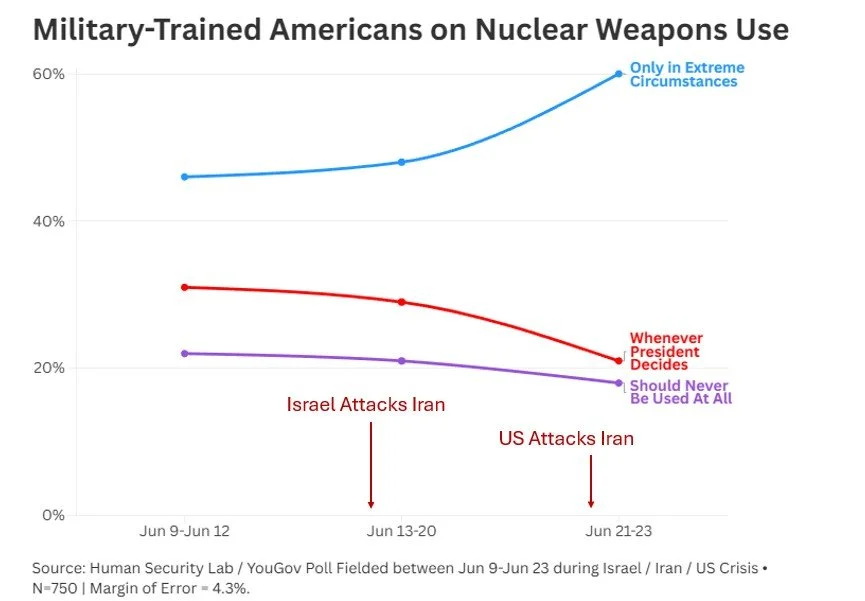As Iran Crisis Unfolded, Military-Trained Americans’ Support of President’s Nuclear Launch Authority Plummeted in Real Time
UMass Amherst’s Human Security Lab has released results from two surveys of military-trained Americans’ attitudes toward nuclear weapons in Bulletin of the Atomic Scientists.
READ IT HERE: Military-Trained Americans’ Trust in the President’s Nuclear Launch Authority Dropped During the Iran Crisis. Here’s Why it Matters.
Key Points:
83% of Troops/Veterans Say Nuclear-Bombing a City Would Be a War Crime
62% Support a “No-First-Use” Norm
Only 1/3 Think the President Should Retain Sole Nuclear Launch Authority
This last number dropped even further - by an additional 10 points - during the recent Iran Crisis and has also decreased since President Trump took office.
Read more here.
___________________________________________________
The number of military-trained Americans who believed that the Commander in Chief should retain sole decision-making power over the US nuclear arsenal plummeted by 10 points during the recent Iran crisis, according to new survey data from UMass Amherst’s Human Security Lab.
The survey, collected in collaboration with YouGov and funded by Lex International and the Swiss Philanthropy Foundation, was exploring the attitudes of 750 US veterans and active-duty military personnel toward US nuclear posture.
According to the survey, only a minority of troops and veterans (30%) believe that the US Commander-in-Chief should continue to be able to use a nuclear weapon whenever he deems it necessary. Nearly half (48%) say they would support a policy that nuclear weapons could only be used under “limited and extreme circumstances.” 21% of respondents state that nuclear weapons “should never be used under any circumstances.”
Moreover, military-trained Americans shifted further away from a trust in the Commander-in-Chief’s discretion to launch a nuclear weapon during the recent Iran crisis. The survey happened to be in the field between Jun 9 and Jun 23, spanning the period when first Israel and then the United States attacked Iran’s nuclear sites. When disaggregating attitudes on this question as a three-phase time-series, the percentage of survey respondents supporting the President’s discretionary authority over nuclear weapons dropped a full 10 points as the crisis unfolded.
Those participants expressing an interest in limiting US nuclear posture to extreme situations were also asked to describe the kinds of limits they want placed on nuclear weapons. 44% supported nuclear use only if authorized by an additional oversight authority besides the President.
In addition, 27% stated they would only support nuclear use against other nuclear powers; 62% said only in retaliation for a nuclear strike against Americans; 33% said only if such weapons could be directed solely at military objectives; 29% said nuclear weapons should only be used it there would be no radiological effects on civilians or the environment.
These numbers have jumped since Trump took office in January, compared to a similar Human Security Lab / YouGov poll fielded in July 2024, during the height of the US general election season. Across every category, the percentage of military-trained respondents arguing in favor of specific limitations on nuclear launch authority has risen since last year.
Respondents were also invited to imagine a hypothetical scenario where they were in the military and were ordered to participate in a chain of events that would culminate in nuclear-bombing a civilian city. Fewer than half (44%) stated they would obey such an order. 42% stated openly they would refuse. Another 14% chose “other,” with most participants in that category writing in their own words statements that conveyed an unwillingness to unthinkingly obey such an order.
Some wrote it would “depend on whether the US had been hit first,” on “whether the order was lawful,” on “whether I trust the President’s intentions.” When describing what they would likely do, some wrote they would seek clarifications, demand more information, protest up the chain of command, resign, go AWOL, or “become violently ill” if faced with such a command.
A team of two political scientists, a doctoral student and six undergraduate students have been working at Human Security Lab to analyze and visualize the results of the two surveys.

